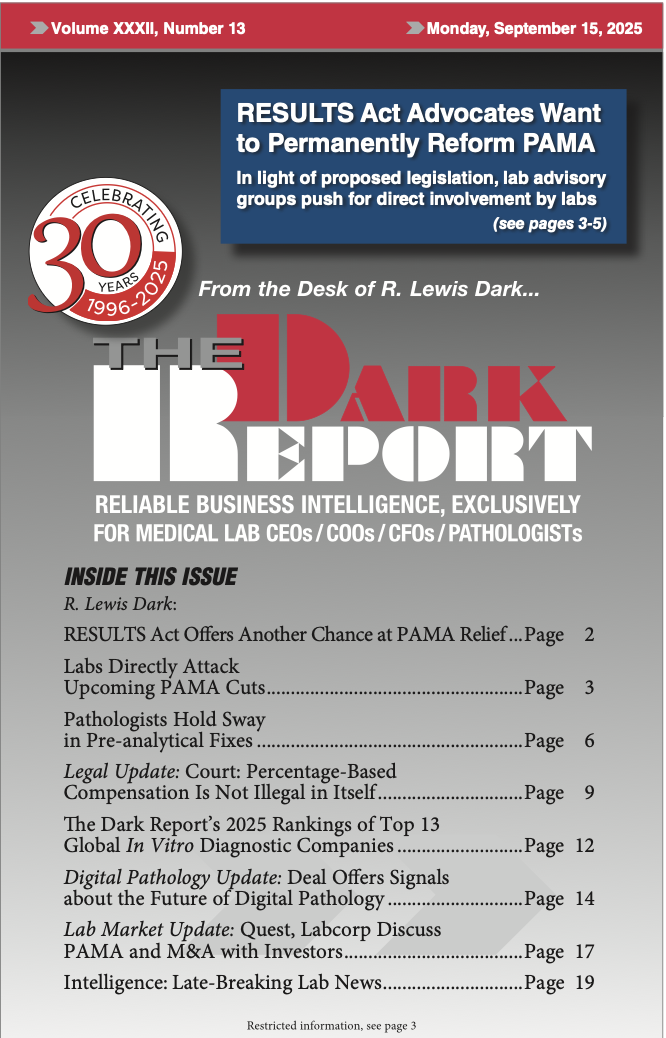Robert Michel
 Until Robert L. Michel came along and founded The Dark Intelligence Group (DIG) two decades ago, the clinical laboratory industry and the anatomic pathology profession lacked a trustworthy source for information about the management and operations of medical laboratories. From its inception in 1995, The Dark Report quickly became the “go to” source of industry intelligence, innovations in lab management, and strategic market analysis.
Until Robert L. Michel came along and founded The Dark Intelligence Group (DIG) two decades ago, the clinical laboratory industry and the anatomic pathology profession lacked a trustworthy source for information about the management and operations of medical laboratories. From its inception in 1995, The Dark Report quickly became the “go to” source of industry intelligence, innovations in lab management, and strategic market analysis.
This excellence in reporting has earned recognition from his peers. For example, twice Michel and The Dark Report have won national awards for best investigative reporting by the Specialty Information Publishers Association. In 2005, the award was for Michel’s coverage about how the anatomic pathology condominium laboratories (pod labs) operated by urologists and gastroenterologists came to be, who operated them, and how these owners marketed the AP condo labs to other physician groups. In 2009, Michel’s award for best investigative reporting resulted from his published interviews with Quest Diagnostics Incorporated when the company admitted that, for a period of 18 months, it had been reported inaccurate Vitamin 25(OH) D results because of problems with its laboratory-developed test methodology. The Dark Report’s story was picked up by The New York Times and was in the national news cycle for several days.
In his role as Editor-in-Chief, Michel brought unique capabilities to DIG and The Dark Report. His management training and diverse business experience—along with his skills as a concise writer and analyst—proved to be a winning combination for readers of The Dark Report. For that reason, Michel’s story has many intriguing elements.
Immediately prior to founding DIG, he had served in several executive positions for Nichols Institute based in Portland, Oregon, and San Juan Capistrano, California. This was during the time that Nichols Institute was an independent public lab company with annual revenues of about $280 million (prior to its acquisition by MetPath, Inc., now Quest Diagnostics Incorporated). He traveled extensively to many of the clinical lab business units owned by Nichols Institute in different regions of the United States and played a role in formulating effective market strategies in response to the emergence of closed-panel HMOs, capitated pricing, and full-risk managed care contracts, among other successful management initiatives.
Prior to his service at Nichols Institute, Michel served at three different Fortune 100 companies. These were Procter & Gamble, Centex Corporation, and Financial Corp. of America. Each was an opportunity to master new management techniques and apply them in different industries. Between these positions, he gained experience as an entrepreneur, having founded a real estate development firm and a general contracting company in the Southeastern United States.
Robert Michel earned a Bachelor of Arts degree in Economics at the University of California, Los Angeles, where he played rugby, a sport he participated in for another 22 years. He is a native of California and grew up in Santa Ana.
Articles by Robert Michel
Smaller Pathology Groups Explore Consolidation
From the Volume XVIII No. 5 – April 11, 2011 Issue
CEO SUMMARY: In eastern Washington State, InCyte Pathology is developing a strategy that may well be repeated many times over in the coming years. As older pathologists who run smaller groups look to retire, they will consider selling their group practices to larger entities inte…
G-Men Mistakenly Raid Pathology Lab in Calif.
From the Volume XVIII No. 5 – April 11, 2011 Issue
CEO SUMMARY: On February 10, 15 armed agents from the Department of Justice (DOJ) arrived at a pathology laboratory in Chico, California, to serve a search warrant and seize billing records, computers, and other evidence believed to be associated with fraudulent billing for CPT c…
Seven Deadly Sins of Lab Management Are Much Too Common
From the Volume XVIII No. 5 – April 11, 2011 Issue
CEO SUMMARY: Pity the poor laboratory manager of today. Lab budgets are shrinking. It is difficult to staff adequate numbers of skilled medical technologists. Baby boomers are now retiring. At the same time, accreditation and licensure inspections are becoming tougher. Recently, …
Lack of Succession Plan Now Hurts Many Labs
From the Volume XVIII No. 5 – April 11, 2011 Issue
CEO SUMMARY: Throughout the past decade, laboratory administrators and pathologists have been reminded about the importance of having a succession plan in their laboratory. Now one veteran lab industry CEO says the lack of a succession plan, unexpected retirements, the d…
Time to Think About ACOs And Medical Homes
From the Volume XVII No. 4 – March 21, 2011 Issue
CEO SUMMARY: In less than nine months—on January 1, 2012—the new health reform legislation mandates that Medicare commence value-based purchasing. Medicare must also begin contracting with accountable care organizations (ACO). Experts say these two developments will initiate …
PAML to Enter Kentucky With New Laboratory JV
From the Volume XVII No. 4 – March 21, 2011 Issue
CEO SUMMARY: This latest laboratory joint venture, in partnership with Saint Joseph Health System, gives Pathology Associates Medical Laboratories, LLC (PAML), a solid presence in Kentucky’s laboratory testing marketplace. Over the past 10 years, PAML, which is based in the Pac…
Pathology Group Establishes Lab Test Exchange Networks
From the Volume XVII No. 4 – March 21, 2011 Issue
CEO SUMMARY: After several decades of steadfastly maintaining their independence from other pathology groups in their community, progressive hospital-based pathology groups are beginning to create regional laboratory testing networks. These collaborations generally start small an…
Controlling Test Utilization By Physician Use of CPOE
From the Volume XVII No. 4 – March 21, 2011 Issue
CEO SUMMARY: Systems for computerized physician order entry (CPOE) and clinical decision support can contribute to better utilization of laboratory tests while achieving improvements in patient outcomes. At Decatur Memorial Hospital, use of CPOE helped physicians slash the volume…
March 21, 2011 “Intelligence: Late Breaking Lab News”
From the Volume XVII No. 4 – March 21, 2011 Issue
Regulation of genetic tests by the Food and Drug Administration (FDA) continues to move forward. Earlier this month, an FDA advisory panel conducted hearings on this subject. The Molecular and Clinical Genetics Panel of FDA’s Medical Devices Advisory Committee discussed several asp…
Pennsylvania Lab Earns ISO 15189 Accreditation
From the Volume XVIII No. 3 – February 28, 2011 Issue
CEO SUMMARY: Clinical laboratories often promote themselves as being able to deliver quality results. But simply saying so is not the same as having an outside organization audit the laboratory to accredit its analytical processes and its other operational activities. NMS Labs in Willow G…
CURRENT ISSUE

Volume XXXII, No. 13 – September 15, 2025
The Dark Report examines a new bill that would reform PAMA and avoid reimbursement rate cuts scheduled for January 2026. Clinical laboratory leaders are urged to make their voices heard in Congress. Also, an expert describes how labs can fix pre-analytical errors and avoid disaster.
See the full table of contentsHow Much Laboratory Business Intelligence Have You Missed?
Lab leaders rely on THE DARK REPORT for actionable intelligence on important developments in the business of laboratory testing. Maximize the money you make-and the money you keep! Best of all, it is released every three weeks!
Sign up for TDR Insider
Join the Dark Intelligence Group FREE and get TDR Insider FREE!
Never miss a single update on the issues that matter to you and your business.
Topics
- Anatomic Pathology
- Clinical Chemistry
- Clinical Laboratory
- Clinical Laboratory Trends
- Digital Pathology
- Genetic Testing
- In Vitro Diagnostics
- IVD/Lab Informatics
- Lab Intelligence
- Lab Marketplace
- Lab Risk & Compliance
- Laboratory Automation
- Laboratory Billing
- Laboratory Compliance
- Laboratory Equipment
- Laboratory Information Systems
- Laboratory Management
- Lean Six Sigma
- Managed Care Contracts
- Molecular Diagnostics
- Pathology Trends
- People
- Uncategorized

